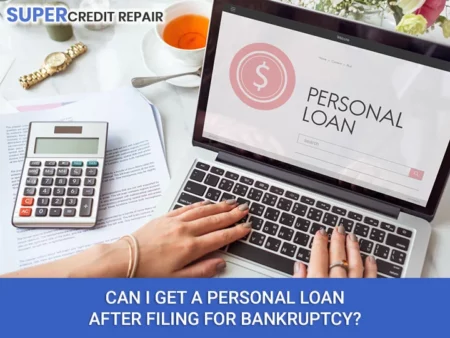 Personal loans are helpful when you’re in a financial bind. However, after filing bankruptcy it may be a while before you can qualify for one of these loans at a low-interest rate. You may also find the entire process challenging, but it isn’t impossible. Here are a few things you should know if you find yourself in this situation.
Personal loans are helpful when you’re in a financial bind. However, after filing bankruptcy it may be a while before you can qualify for one of these loans at a low-interest rate. You may also find the entire process challenging, but it isn’t impossible. Here are a few things you should know if you find yourself in this situation.
How long will filing bankruptcy stay on my credit report?
The first thing you need to remember is that your bankruptcy can remain on your record for 10 years after the filing date. However, if you complete your payment plan on time, some people have found that their Chapter 13 bankruptcy has dropped off their credit report in 7 years. This is especially true with your discharged accounts (those that you were late paying or that defaulted prior to your bankruptcy).
Can I get a personal loan after filing bankruptcy?
After you file bankruptcy your credit score will probably fall beneath the lender’s minimum score requirements. Even if your credit recovers, your bankruptcy may be visible depending on what type of bankruptcy you filed. However, the longer it’s been since filing bankruptcy the more likely it is that you can get a personal loan. This is especially true if you’ve been able to take out a credit-builder loan or secured credit card.
How do I find a lender to work with after I file bankruptcy?
The best place to start looking for a personal loan after bankruptcy is credit unions, online lenders, and community banks. You may also want to talk to friends and family members who have good credit to see if they’re willing to co-sign for you. This makes the other person responsible for this debt so it could place a strain on your relationship.
Is there anything I should watch out for?
The main thing that you’ll need to watch out for when you’re looking for a personal loan after you’ve filed for bankruptcy is what’s known as “no credit check loans” or “payday loans.” These loans are made by lenders who promise you a loan without conducting a credit check. They’ll also guarantee an immediate payout regardless of your payment history. Typically they’ll charge higher interest rates. You’ll also encounter either high fees or a high annual percentage rate (APR). This may result in debt that you can’t afford to repay.
Unfortunately, you may not even be told about the APR. This is legal because they charge a flat-rate fee that makes it difficult for you to compare your options. What they aren’t telling you is that they’re charging triple-digit APRs (sometimes as high as 400%). This is why they’re sometimes referred to as “high-APR installment loans” or “high-APR lines of credit.”
What does all of this mean for me?
Before you take out a personal loan, make sure you’ve thought through all your options. While you may find someone to approve your loan, you may find it difficult to repay it along with all the other debts you owe. This could cause you to fall behind on your bills and damage your credit once again. Since you’ll need to wait (2 years for Chapter 13, 8 years for Chapter 7) before declaring bankruptcy again.
The bottom line is that while filing bankruptcy may be the best option for you, it’ll hurt your credit for years into the future. If you need a personal loan during this time, you’ll either need a co-signer or be willing to accept a higher rate. For help with any of these issues, contact us at Super Credit Repair in Clearwater, FL.
Picture Credit: Freepik